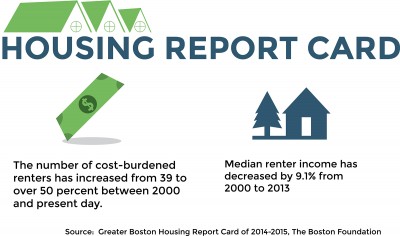Demand for housing in Boston is currently out of line with supply, according to the 12th annual Greater Boston Housing Report Card of 2014-2015, released Tuesday by The Boston Foundation.

While the Boston economy is thriving, there are hidden struggles occurring in the housing market, stated the report, which was prepared by the Kitty and Michael Dukakis Center for Urban and Regional Policy and addresses ways to approach and solve housing affordability issues in Boston and its surrounding neighborhoods.
Over 290,000 millennials ages 20-34 reside in Boston, Cambridge and Somerville. In order to afford the increased rent prices, many young business professionals must either split the cost with roommates or seek housing elsewhere, the report stated.
The number of “cost-burdened renters” has increased from 39 percent to over 50 percent between the year 2000 and present day, the report stated.
Barry Bluestone, director of the Kitty and Michael Dukakis Center and lead author of the housing report, said he hopes the city will take into account the suggestions made in the report.
“We hope they’ll take our advice, and that is to work closely with architects, developers, construction firms, construction trades, universities and hospitals to build a brand new coalition to develop a large amount of housing for graduate students, medical residents and interns and other young professionals,” he said.
Boston Mayor Martin Walsh aims to have 53,000 moderate to low-income housing units built by 2030, the report stated. Bluestone said this is one of the ways in which the mayor is accommodating the older residents within the area.
“The millennium villages are particularly for 20-to-34-year-olds, but there are other programs that the mayor has for working families, for low-income families, as well,” he said.
The Kitty and Michael Dukakis Center for Urban and Regional Policy also develops programs for aging baby boomers in Boston, Cambridge and Somerville, Bluestone said.
“They want to now move into smaller homes, more appropriate homes, so we’re working on that,” Bluestone said. “That’s particularly true in the suburbs.”
The report stated that some communities across the Boston area do not allow multi-unit apartments to be built, and many other regulations stand in the way of further construction.
Members of the Greater Boston Chamber of Commerce and the Boston Foundation’s Commonwealth Housing Task Force are now getting involved, Bluestone said. He said he encourages citizens of the communities affected to speak out for this cause.
“It’s going to be very important for people in each community to let their representatives know that [this] is something they need, they’re looking for that kind of housing, and they need their communities to rezone so they’ll have that housing available,” he said.
Several residents said higher rents have allowed for the spread of high-income families into new areas, while pushing college students and low-income families out of affordable areas.
Beatriz Diaz, 40, of the North End, said her particular neighborhood is home to many elders who live in three-to-five-story buildings. There has been an influx of high-income families in recent years.
“I haven’t personally seen gentrification happen in this neighborhood, mostly because many of the people that live in the North End own their house or rent at high prices,” she said. “The newer constructions are catered to high-income families, as they are located very conveniently in front of the Haymarket [train] stop.”
Barbara Bucelewicz, 78, of Allston, said rent increases may eventually price out college students living in and around her neighborhood.
“It’s going to be a very up-and-coming neighborhood. There are so many new developments being made right now for people to live in,” she said. “Allston right now is mostly college kids, but I have a feeling that someday, college kids will not be able to afford this area as years go on.”
Jason Turesky, 26, of Brighton, said the amount of young professionals trying to move to Allston and Brighton continues to grow.
“It will become harder for low-income housing, especially if the Olympics come in 2024 and drive up real estate prices,” he said. “Through law though, and conscious effort, low-income housing will continue to be available, but scarcer.”





















































































































